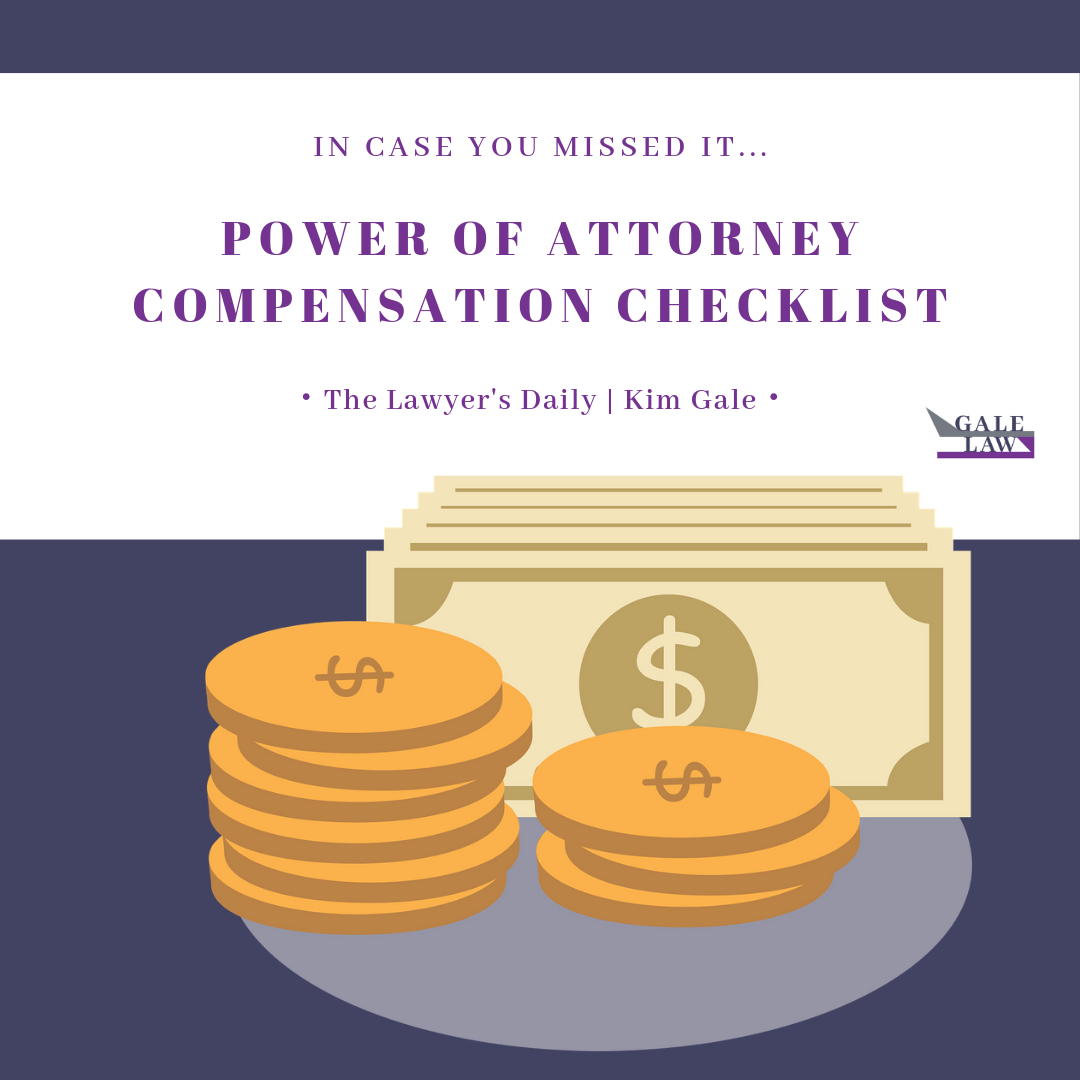
This article was originally published by The Lawyer’s Daily (www.thelawyersdaily.ca), part of LexisNexis Canada Inc.
By Kimberly Gale
If your client is appointed as attorney for property and/or attorney for personal care under a power of attorney document, here is a quick checklist of how to advise them on their compensation.
The Fee Schedule
Section 40(1) of the Substitute Decisions Act, 1992, c. 30 (SDA) provides: “A guardian of property or attorney under a continuing power of attorney may take annual compensation from the property in accordance with the prescribed fee scale.” [emphasis added]
The fee scale is contemplated in s.40(1) of the SDA and set out in Ontario Regulation 26/95, section 1:
“An Attorney for Property shall be paid:
3% on capital and income receipts;
3% on capital and income disbursements; and
3/5 of 1% of the annual average value of the assets under administration as a ‘care and management fee.’ ”
Proper Records
An attorney for property must act in the best interest of the incapable person and keep proper records.
The accounts maintained by an attorney under a continuing power of attorney and a guardian of property shall include (relevant terms bolded):
- A list of all the incapable person’s assets as of the date of the first transaction by the attorney or guardian on the incapable person’s behalf, including real property, money, securities, investments, motor vehicles and other personal property;
- An ongoing list of assets acquired and disposed of on behalf of the incapable person, including the date of and reason for the acquisition or disposition and from or to whom the asset is acquired or disposed;
- An ongoing list of all money received on behalf of the incapable person, including the amount, date, from whom it was received, the reason for the payment and the particulars of the account into which it was deposited;
- An ongoing list of all money paid out on behalf of the incapable person, including the amount, date, purpose of the payment and to whom it was paid;
- An ongoing list of all investments made on behalf of the incapable person, including the amount, date, interest rate and type of investment purchased or redeemed;
- A list of all the incapable person’s liabilities as of the date of the first transaction by the attorney or guardian on the incapable person’s behalf;
- An ongoing list of liabilities incurred and discharged on behalf of the incapable person, including the date, nature of and reason for the liability being incurred or discharged;
- An ongoing list of all compensation taken by the attorney or guardian, if any, including the amount, date and method of calculation;
- A list of the assets and value of each, used to calculate the attorney’s or guardian’s care and management fee.
No Receipts
If cash was paid, the attorney for property should detail the amount, date, purpose of payment and whom it was paid, to satisfy this requirement.
However, the Zimmerman v. McMichael Estate 2010 ONSC 2947 case elaborates that an attorney will be held personally liable for unsubstantiated withdrawals if the attorney fails to retain receipts supporting substantial cash withdrawals. This case makes it clear that without proper accounting as a condition for being awarded compensation, the court is unable to assess the conduct of the fiduciary to determine the entitled compensation.
In Rodney and Ian Hull’s book, Macdonell, Sheard and Hull on Probate Practice, they state that the court can only deprive the executor of compensation for exceptional misconduct. If the neglects are not dishonest the executor cannot be deprived; however, the amount of compensation received might be influenced.
An attorney may be disentitled to compensation where the attorney fails to keep proper accounts and was grossly indifferent to his/her fiduciary obligations. Only exceptional misconduct should deprive an attorney of their right to remuneration.
Passing of Accounts
A passing of accounts is where an attorney for property would present their accounts in the presentation of formal accounts to the court and ask for the court to approve their accounting. It is like a court audit of your accounts. It is brought by way of application.
There is no obligation for an attorney for property to pass his/her accounts.
Other parties may apply for the attorney for property to pass their accounts. The following persons may also apply (s.42 (4) of the SDA):
- The grantor’s or incapable person’s guardian of the person or attorney for personal care.
- A dependant of the grantor or incapable person.
- The Public Guardian and Trustee.
- The Office of the Children’s Lawyer.
- A judgment creditor of the grantor or incapable person.
- Any other person, with leave of the court.
In reference to number 6, case law that states such leave shall be granted sparingly, with some evidence of misconduct (Groh v Steele 2017 ONSC 3625).
As set out in para 40(1) of the SDA, an attorney for property is entitled to take annual compensation according to the prescribed fee.
Therefore, an attorney for property does not need to pass their accounts to take compensation, unlike an estate trustee. However, it is prudent that attorneys keep proper records to prove that expenses were properly incurred on behalf of the incapable person and that compensation was taken according to the fee schedule.

